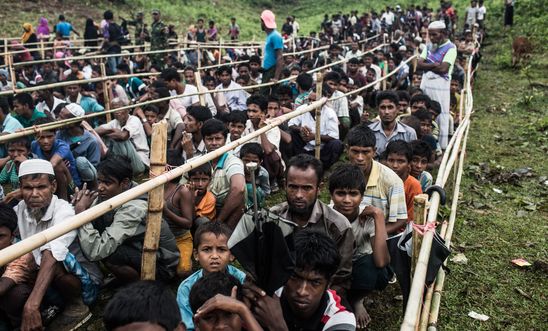
Press releases
More global support needed for Bangladesh in helping Rohingya refugees

More countries need to increase their support for Rohingya refugees in Bangladesh amid an unprecedented humanitarian crisis, Amnesty International said today.
The meeting of high-level representatives of donor countries at the UN in Geneva on Monday must include pledges of new funding, including from countries in the region, to support rising numbers of Rohingya refugees who have sought shelter in the Bangladesh district of Cox’s Bazar.
The recent influx - estimated to be nearly 600,000 people - has brought the total Rohingya refugee community in Cox’s Bazar to more than 800,000.
Omar Waraich, Deputy South Asia Director at Amnesty International, said:
“This is an unprecedented crisis that needs an immediate and sustained response from the international community. This means that more countries, particularly those from the region, need to play a much bigger role and share the burden of responsibility. Bangladesh, a poor country which has shown extraordinary generosity, cannot be left to deal with this situation alone.
“These deeply-traumatised refugees are subsisting in extremely difficult conditions, with no prospect of being able to return home any time soon. The international community must mount a response that addresses both their immediate and long-term needs.”
An Amnesty delegation visiting the refugee camps in Cox’s Bazar this week found overcrowded camps where new arrivals are squeezed into flimsy bamboo and tarpaulin tents. Their access to life-saving assistance, medical facilities, safe areas for women and schooling for children remains restricted.
Humanitarian agencies have identified high levels of severe malnutrition, particularly among children, as well as a heightened risk of diseases, such as cholera, due to poor water and sanitation conditions.
There are also clear needs for comprehensive psychosocial assistance or support programmes for the desperate population, who will require sustained help if their full physical, mental and emotional recovery is to be enabled.
Harrowing journey
The international community should address a range of urgent needs of Rohingya refugees, from transportation to camps, to medical and life-saving assistance.
Refugees interviewed by Amnesty recalled harrowing journeys from their villages to the camps in Bangladesh, with many coming under attack as they fled. Many said they had been forced to pay extortionate sums to be transported in boats to Bangladesh. Those without money told Amnesty that they were forced to part with jewellery and other valuable possessions to pay for the boat crossing.
Charmain Mohamed, Amnesty’s Head of Refugee and Migrant Rights, said:
“Rohingya refugees who walked for days - often barefoot, hungry and injured, depleting all reserves - are faced with extortion to make the last leg of their journey.
“When they finally reach Bangladesh, some of the refugees have been left to make a miles-long walk further still, to reach the camps. Their journeys should not be made any more difficult than they already are. They need to be supported at every stage of their search for safety.”
Accountability for crimes against humanity
Beyond the immediate needs, the international community must help Bangladesh cope with the humanitarian crisis going forward. This includes calling for accountability for crimes against humanity and the dismantlement of the entrenched system of discrimination that the Rohingya have long endured in Myanmar.